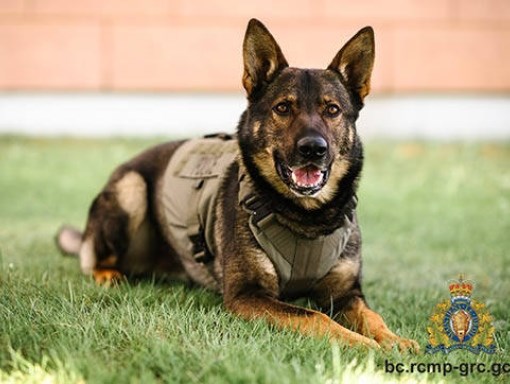The fatal shooting of an Indigenous man in Campbell River in a confrontation that also left a police service dog dead raises questions about the use of police dogs to apprehend suspects, says a criminal defence lawyer.
Sarah Runyon said she’s concerned there’s a “systemic over-reliance” on the use of police service dogs in situations that call for de-escalation.
“We need to re-evaluate our willingness to accept that a dog can be deployed to not simply trace, but to apprehend and confine, when common sense and experience dictates that the likely result is serious bodily harm,” Runyon said.
Jared Lowndes, a 38-year-old father of two, was shot by Campbell River RCMP just before 9 a.m. on July 8. Police had tried to pull him over for an outstanding warrant but he failed to stop and fled the area.
A short time later, an officer spotted his vehicle in the Tim Hortons parking lot in the 2000-block of the South Island Highway.
A police officer boxed in the vehicle and a confrontation occurred between the suspect and the police officer, who had a police service dog, the RCMP said. During the interaction, police service dog Gator was stabbed and killed, and the suspect was shot and pronounced dead at the scene. The dog handler was treated for a knife wound.
Court documents reveal a warrant for Lowndes was issued on March 21, 2021 for allegedly breaching a conditional sentence order.
In December 2020, Lowndes was convicted in B.C. Supreme Court in Vancouver of two firearms offences dating to April 2013. He was convicted of possessing a restricted firearm with ammunition and contravening a regulation regarding storage or transportation of a firearm and restricted weapons.
Runyon said that in recent years, she has represented a number of people, most often Indigenous men, who feel police have responded in a way that was out of proportion to what the situation warranted.
Runyon represented Shane Roberts, who was also bitten by Gator, during an arrest on July 30, 2016. Roberts drove away during a traffic stop and was pursued by police. Roberts, who had no previous criminal record, is also Indigenous. He suffered severe complications as a result of the dog bite. He spent several months in the intensive care unit and almost lost his leg.
Runyon has also launched a Charter challenge for another Campbell River man, Ray Sharkey, who was bitten by Gator in January when he tried to run away from police after a domestic incident.
In 2015, the province introduced new guidelines saying police would no longer be able to deploy dogs to bite people suspected of relatively minor crimes. The standards follow a report that found dogs are the leading cause of injury by police forces across British Columbia.
Provincial policing standards say a bite might occur if the person is causing, or about to cause, bodily harm to an officer, a third party or the police dog, or if the person is fleeing or hiding and there are reasonable grounds for immediate apprehension by a police dog bite.
Police dog handlers must also conclude that the bite is justified and that no lesser use of force would be effective. They must consider the seriousness of the offence, the potential risk to people, whether the person could be apprehended at a later time, whether a weapon is involved and whether the person has threatened violence or has a history of violence.
The Independent Investigations Office of B.C. is investigating police actions in Lowndes’ death, along with actions during the arrest of a Quadra Island resident who received a serious police-dog-bite injury Sunday evening.
On Tuesday, a memorial march by Lowndes’ family and supporters demanding “Justice for Jared” made its way to the Campbell River RCMP detachment, CHEK News reported. Lowndes’ mother, Laura Holland, confronted three RCMP officers, telling them they should be ashamed of themselves.
“This time, we are going to be so loud, Canada will never want to kill another Indigenous person,” she said.
She placed Lowndes’ ashes outside the door of the detachment, then put a bouquet on the memorial to Gator.
Holland is calling for a public inquest, the disarmament of police on Indigenous lands and body cameras for police officers.
“All police forces should end the use and abuse of police dogs for police work. We will never stop seeking justice for Jared. It is in his memory that I will ensure that this does not happen to any other precious Indigenous life,” Holland said.
Grand Chief Stewart Phillip, president of the Union of B.C. Indian Chiefs, supported the Lowndes’ family’s demand for the appointment of an Indigenous investigator and civilian monitor to the IIO. He called for a public inquest into the incident, which he called “but the latest in an unacceptable and racist series of Indigenous people dying through police actions.”
Last week, the First Nations Leadership Council also called for a public inquest in the case.


